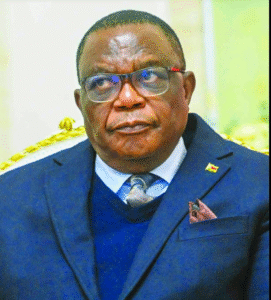CHIEFS STEP UP AS ZIMBABWE FINALLY FACES GUKURAHUNDI TRUTH

After four decades of silence, fear, and painful memories, Zimbabwe may finally be taking a serious step toward healing. The National Council of Chiefs, led by Deputy President Chief Fortune Charumbira, has announced a bold outreach programme to confront one of the darkest chapters in the country’s history—the Gukurahundi massacres.
Between 1982 and 1987, the Fifth Brigade, a brutal army unit reporting directly to the presidency, unleashed terror on the people of Matabeleland and parts of Midlands. Thousands were tortured, killed, or disappeared. Entire communities were shattered, and decades later, no one has been held accountable. For the people of Matabeleland, the silence from government and leaders has been more painful than the bullets.
Now, Chief Charumbira says that silence must end.
Speaking in Bulawayo, he unveiled a plan to hold public hearings starting in Matabeleland North and South, then moving to Midlands. Survivors, victims’ families, and affected communities will finally get a chance to speak—openly and officially. For many, it will be the first time they can share their stories without fear.
This is not just another government programme. This is being led by the traditional leaders of Zimbabwe. And that matters. These chiefs are not politicians—they are the custodians of culture, identity, and memory. They represent the people, not political parties. Their role gives this initiative a kind of moral weight that government ministers and ruling party functionaries could never carry.
Presiding over the council is Chief Mtshane Khumalo, great-grandson of the famed Ndebele general who fought colonialism at the Battle of Pupu in 1893. That historical resistance—against British invaders—is etched into the DNA of the people of Matabeleland. By placing a Khumalo descendant at the helm, this outreach connects past resistance to present healing. The same spirit that resisted the colonial oppressor must now resist silence, denial, and historical erasure.
This move comes at a critical time. Zimbabwe is fractured. The ruling elite has failed to unite the nation. Ethnic tensions still simmer. The memory of Gukurahundi has become a political weapon—used, denied, or buried depending on who is in power. But the victims are still waiting. Some graves remain unmarked. Some families still do not know what happened to their loved ones. The pain never went away. It was only hidden.
What the chiefs are offering is a platform—not a solution, not an apology, but a space to speak. And that alone is revolutionary in a country where silence is often enforced by fear.
Civil society has welcomed the move. Survivors are hopeful. But everyone knows the risks. Will the government interfere? Will the truth be allowed to come out? Or will these hearings be watered down to protect powerful individuals? These are real fears. But for now, the focus is on the opportunity. This is a chance to begin writing a new chapter in Zimbabwe’s post-independence story—one that acknowledges past crimes and dares to confront them with honesty.
The chiefs are stepping where presidents have feared to tread. They are using their authority to do what the government has failed to do for 40 years—listen.
There will be resistance. There will be backlash. But this is how healing starts. Not with press statements, but with truth. Not with amnesia, but with memory. Not with top-down orders, but with grassroots voices.
If done right, these public hearings could change the course of Zimbabwean history. If the truth is allowed to surface, if victims are allowed to speak, and if real steps follow to honour, compensate, and restore dignity, then this could be the beginning of national healing.
Gukurahundi is not just a Ndebele issue. It is a Zimbabwean issue. And finally, after four decades, the country may be ready to listen.



